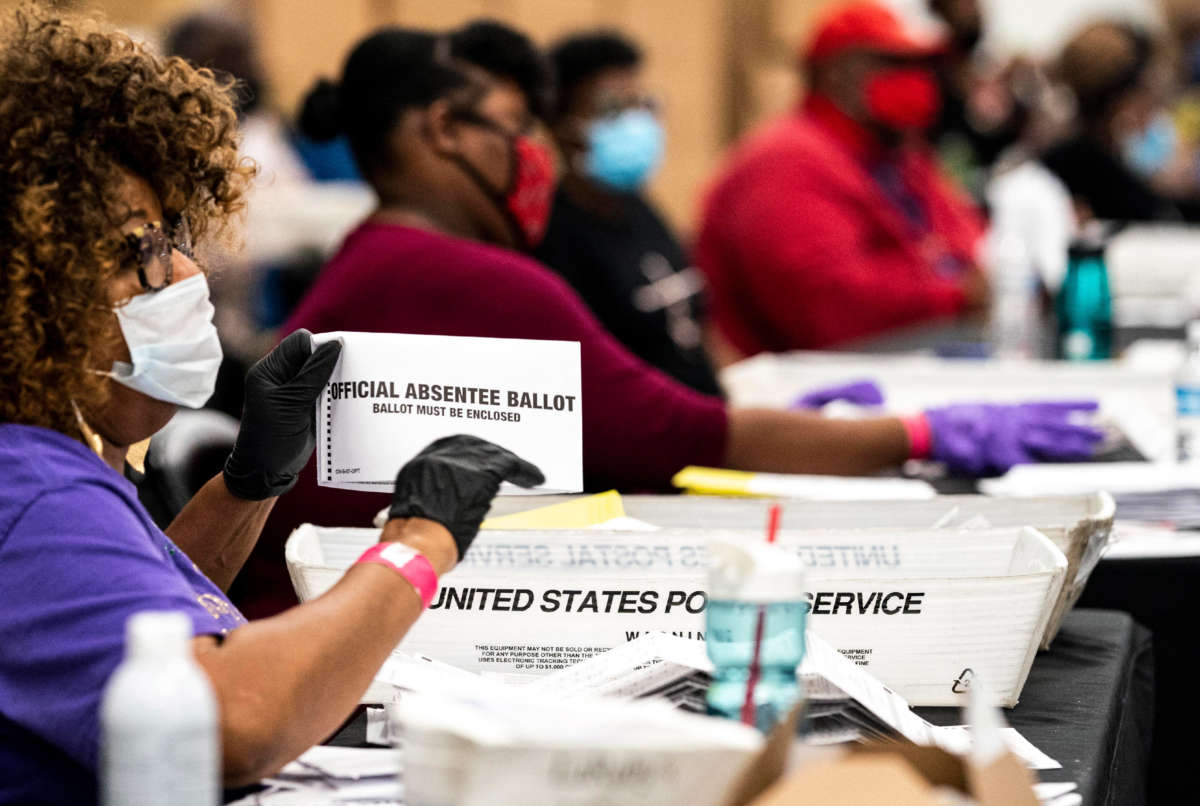Did you know that Truthout is a nonprofit and independently funded by readers like you? If you value what we do, please support our work with a donation.
A Republican lawmaker in Georgia this week introduced a bill that would require voters to provide two copies of their ID when voting absentee in the state. Georgia flipped blue in the 2020 presidential election after having been dominated by Republicans for decades. It also voted out its two Republican senators and replaced them with Democrats this month.
The bill came just before a new Pew analysis showed that voter turnout was up in every state last year. Nearly two-thirds of eligible voters cast a ballot in November, according to Pew. This is the highest turnout rate since Pew started analyzing election turnout in 1980. In fact, Pew’s findings show that the 2020 turnout rate was the highest since 1900, according to Michael McDonald, a University of Florida professor who specializes in elections. In Georgia, Pew finds, turnout rose 8.6 percent from the 2016 election.
Part of the reason for such high turnout, Pew says, is that states widened voting access during this election cycle, with increased eligibility for voting by mail and expanded early voting because of the COVID-19 pandemic. “Turnout rates increased in every state compared with 2016, but of the 10 states where it rose the most, seven conducted November’s vote entirely or mostly by mail” wrote Drew DeSilver, a senior writer at Pew.
Don’t miss a beat
Get the latest news and thought-provoking analysis from Truthout.
The new GOP legislation in Georgia would require voters to send a photocopy of valid ID both when applying for an absentee ballot and when submitting it. Adding another hurdle to voting makes it harder for people to cast their ballots, and Joe Biden’s win in Georgia renewed Republican efforts such as this week’s bill to add further hurdles or, as they tried in December, limit absentee voting altogether. Absentee votes in Georgia overwhelmingly went toward Biden in November, by a margin of nearly two to one.
By requiring access to a printer, which many Georgians obviously do not have, Republicans are attempting to purposely take away the ability of many Georgians to vote by mail simply because they believe too many Democrats and too many people of color voted by mail. #gapol
— Fair Fight (@fairfightaction) January 27, 2021
Higher turnout traditionally leads to more votes for Democrats. Donald Trump himself admitted that expanding voting access would be bad for him last year, saying, “The GOP is hurt when it’s easier to vote” on Fox.
The high 2020 turnout reported by Pew on Thursday means that expanded mail-in and early voting likely helped to clinch Biden’s victory. Turnout for the Senate special election which also flipped both of Georgia’s seats blue also saw higher numbers of early and absentee ballots than usual.
Now that Georgia has flipped blue in both the presidential and Senate elections, Republicans have set their sights on the state, Politico reports. One Republican in the state has even openly admitted that they feel they have to skew the voting rules in their favor in order to win. “They don’t have to change all of [the rules], but they’ve got to change the major parts of them so that we at least have a shot at winning,” Alice O’Lenick, a Republican on Gwinnett County’s Board of Elections, told a local paper last week.
But this most recent GOP bill in Georgia is simply another in a long string of attempts to suppress voting, which was especially on display this election cycle.
Voting by mail was a contentious topic during the 2020 election, with Trump attacking it without evidence at every turn. Republicans denounced voting by mail — while simultaneously trying to use it to their advantage — and reportedly used other tactics to discourage voters, especially people of color, from casting their ballots.
The attacks on voting by mail were part of a larger Republican strategy of voter suppression. Trump slashed funding at the United States Postal Service to make it harder for post offices to process ballots; there were numerous GOP attempts to throw out early and absentee ballots; and Republicans in several states filed lawsuits to stop officials from making mail-in voting easier. The list goes on.
Republicans in Georgia claim that the newly proposed voter ID bill is about preventing fraud, but an audit of 15,000 ballots in the state after the 2020 election found zero evidence of fraud. In fact, states across the country found the same.
Speaking against the authoritarian crackdown
In the midst of a nationwide attack on civil liberties, Truthout urgently needs your help.
Journalism is a critical tool in the fight against Trump and his extremist agenda. The right wing knows this — that’s why they’ve taken over many legacy media publications.
But we won’t let truth be replaced by propaganda. As the Trump administration works to silence dissent, please support nonprofit independent journalism. Truthout is almost entirely funded by individual giving, so a one-time or monthly donation goes a long way. Click below to sustain our work.
